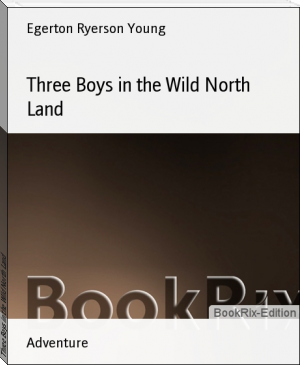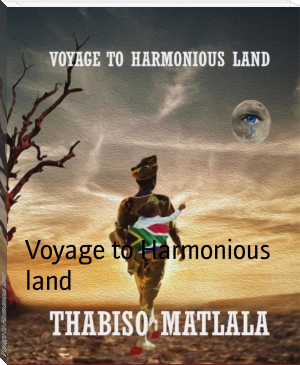Three Boys in the Wild North Land, Egerton Ryerson Young [best large ereader txt] 📗

- Author: Egerton Ryerson Young
Book online «Three Boys in the Wild North Land, Egerton Ryerson Young [best large ereader txt] 📗». Author Egerton Ryerson Young
CHAPTER ONE.
WELCOME TO SAGASTA-WEEKEE--MR. ROSS, THEIR HOST--THE THREE BOYS--FRANK, ALEC, SAM--THE "PRINCE ARTHUR"--THE VOYAGE--THE ESQUIMAUX--ARRIVAL AT YORK FACTORY.
"Welcome to this Wild North Land! welcome to our happy home in the Land of the North Wind! Welcome, thrice welcome, all and each one of you!"
Thus excitedly and rapidly did Mr Ross address a trio of sunburnt, happy boys, who, with all the assurance of a joyous welcome, had burst in upon him in his comfortable, well-built home, or "hunting lodge," as he preferred to call it, on the banks of the Nelson River. This cozy but isolated home was situated some hundreds of miles up in the interior of the country from York Factory, on the Hudson Bay.
Mr Ross had named his house "Sa-gas-ta-wee-kee," a beautiful Indian word which literally means a house full of sunshine. Mr Ross had spent many years as an official in the Hudson Bay Company's service, as had his father before him. A few years before this, being possessed of abundance of means, he had retired from active work in the great fur- trading company. He had tried to settle down in an older, civilised land, but had found it impossible to content himself away from those regions where he had spent the best years of his life. His wife and family were of the same mind, and so, after some years of travel in various lands, they returned to this northern country where they had spent so many happy years.
Every year or so Mr Ross with some members of his family was in the habit of visiting what he loved to call the mother country. So full was his life of varied and startling adventures, that he was often asked to give addresses on some of the fascinating experiences, through which he had passed.
Among the crowds who listened to him with intense interest, as he gave a series of addresses in one of the great historic schools in the home land, were the three boys who are to be the heroes of this book. Although they were from different families and nationalities, yet they were congenial spirits, and were equally filled with the love of sport and spirit of exciting adventure.
For such boys Mr Ross's addresses about the Indians, the wild animals, and the excitements of the hunt had the greatest fascination. With Mr Ross they had become personally acquainted, and had induced him to visit their different towns, where he lectured, and to be the guest at their homes, where his delightful stories had charmed every member of their households.
In some way or other they had persuaded their parents to consent to their spending a year or so in the wilds of the northern part of the great Dominion of Canada under the guidance of Mr Ross, who most importunately pleaded for this arrangement on behalf of the boys. As it was impossible for them to return with Mr Ross on account of their studies, several months passed away ere it was possible for them to begin their journey; so he had returned alone to his home, and had made all preparations for entertaining them as members of his household for an indefinite period.
Letters had been sent on in advance notifying Mr Ross of the probable time of the arrival of the boys. But, as often happened in that wild country, where there was no postal service, the letters never arrived, and so the first intimation Mr Ross had of the coming of the boys was their bursting in upon him. Abrupt as was their coming, of course they were welcome. In all new lands there is an open-hearted hospitality that is very delightful, and this was emphatically so in the vast lonely region of the Hudson Bay Territory, where the white men in those days were so few and so widely scattered apart from each other.
And now that they are snugly ensconced in the home of their good friend Mr Ross and his hospitable family, ere we begin to describe their many sports and adventures let us find out something about our heroes, and have them describe some of the exciting incidents of the long trip which they had already made on their journey to this Wild North Land.
Frank, the eldest of the three, was the son of a Liverpool banker. His friends had vainly tried to divert his mind from wild adventure and exciting sports, and persuade him to settle down to steady routine office work. Failing in this, they had listened to Mr Ross's pleadings on his behalf, and had commented to let him have the year in the Wild North Land, hoping that its trials and hardships would effectually cure him of his love of adventure and cause him to cheerfully settle down at his father's business.
Alec was from Scotland, a genuine son of "the mountain and the flood." While a good student when at school, yet, when at home on his holidays, his highest joy had ever been under the guidance of the faithful old gillie to follow on the trail of the mountain deer. For a wider field than that offered by his native Highlands he had been so longing that his friends yielded to his importunities, and so now here he is with his comrades, full of eager anticipations.
Sam was from what his mother used to call "dear, dirty Dublin." He was full of life and fun; a jolly Irish boy of the finest type. Storms and privations might at times depress the spirits of the others; but Sam, true to his nationality, never lost his spirits or his good nature. So rapid had been his progress in his studies that he had pushed himself beyond his years, and so even his tutors had joined in his request that he should have the year off, which, spent in the invigorating air and healthful adventures in the Wild North Land, would doubtless be a blessing to both mind and body:
In the good ship _Prince Arthur_, of the Hudson Bay Company, our three young adventurers set sail in the month of May from the London docks. They met with no adventures worth recording until after they had left the Orkney Islands, where they had called for their last consignment of supplies and the latest mails. Here they also shipped some hardy Orkney men and Highlanders, who were going out in the employment of the Hudson Bay Company.
The _Prince Arthur_ was a stanch sailing vessel, built especially for the Hudson Bay Company's trade. She was employed in carrying out to that country the outfit of goods required in the great fur trade. Her return cargoes were the valuable furs obtained in barter from the Indians. Her port was York Factory, on the western side of the Hudson Bay. Here her cargo was discharged and carried by scores of inland boats and canoes to the various trading posts in the different parts of that great country, which is larger than the whole continent of Europe.
So remote were some of those posts from the seaboard, and so difficult and slow were the methods of transporting the goods, that several years passed ere the fur secured from them reached the London markets, to which they were all consigned and where they were carried each year in the company's ships.
Although the _Prince Arthur_ was far from being a first-class passenger ship, yet she was a good, seaworthy vessel, with plenty of room for the few passengers who travelled by her each year. These were principally gentlemen of the Hudson Bay Company's service and their friends, or missionaries going out or returning home.
Letters from influential friends secured for our three boys the considerate attention of the captain and the ship's officers, and their own bright ways won the friendship of all the sailors on board. On the whole they had a glorious passage. Some fogs at times perplexed them, and a few enormous icebergs were so near that careful tacking was required, to prevent accidents. The boys were filled with admiration at these great mountains of ice; some of them seemed like great islands, while others more closely resembled glorious cathedrals built in marble and emerald. At times, as the western sun shone upon them, they seemed to take on in parts every colour of the rainbow. With intense interest were they watched as they slowly drifted beyond the southern horizon.
One of the most exciting incidents of the journey was a battle between a great whale and a couple of swordfish. The unwieldy monster seemed to be no match for his nimble antagonists. His sole weapon seemed to be his enormous tail; but vain were his efforts to strike his quicker enemies. As far as could be judged from the deck of the ship, the swordfish were masters of the situation, and the blood-stained waters seemed to indicate that the battle would soon be over.
In the southern part of Davis Strait they encountered great fields of floating ice, on which were many herds of seals. The captain had the ship hove to and three boats lowered. In each one he permitted one of the boys to go with the sailors on this seal-hunting expedition. The seals, which are so very active in water, where they can swim with such grace and rapidity, are very helpless on land or ice, and so large numbers were killed by the sailors. While the boys were excited with the sport, they could not but feel sorry for the poor, helpless creatures as they looked at them out of their great eyes that seemed almost human. Some hundreds of skins were secured, much to the delight of the captain and crew, as the profit coming to them from their sale would be no inconsiderable item.
At the mouth of Hudson Strait the captain again had the ship hove to for a day or so to trade with a number of Esquimaux, who had come in their curious canoes, called kayaks, from along the coasts of Labrador. Their insatiable curiosity and peculiar fur clothing very much interested the boys. These Esquimaux were shrewd hands at a bargain, but their principal desire seemed to be to obtain implements of iron in exchange for their furs. They cared nothing for flour, rice, tea, coffee, or sugar. They knew no other food than meat and oil, and so craved no other things than those that could be utilised in improving their weapons. Guns were unknown among them, but they were very skillful in the use of the harpoon and the spear. When they are able to secure iron from the white man they make their harpoon heads, spears, and knives out of this metal, but when unable to secure it they manufacture their weapons out of the horns of the reindeer or the tusks of the walrus or narwhal.
They had among their other furs some splendid bear skins, and the boys were very much interested in hearing them tell through an interpreter how they, with their rude weapons, aided by their clever dogs, had been able to kill these fierce animals. All were very much delighted when told by these friendly Esquimaux how that with two well-trained dogs nipping at the hind legs of a great bear they could keep him turning round and round





Comments (0)